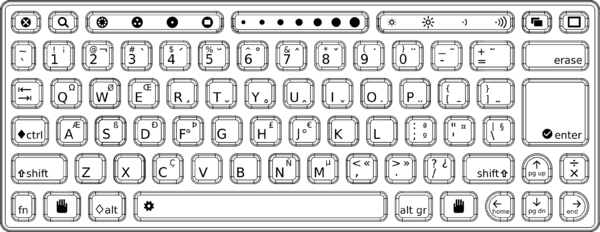Keyboard: Difference between revisions
No edit summary |
(show erase and fn erase images) |
||
| Line 40: | Line 40: | ||
|- |
|- |
||
| '''Backspace''' |
| '''Backspace''' |
||
| [[File:Key_erase.jpg|55px]] |
|||
| erase |
|||
|- |
|- |
||
| '''Delete''' |
| '''Delete''' |
||
| [[File:Key_fn.jpg|23px]][[File:Key_erase.jpg|55px]] |
|||
| fn-erase |
|||
|- |
|- |
||
| '''caps''' |
| '''caps''' |
||
Revision as of 00:26, 31 October 2011
Image:Support-banner-square.png|173px|community support pages rect 0 0 135 204 [1] rect 135 0 345 204 Support FAQ rect 0 205 135 408 [2]
- Comment : there's some whitespace here:
rect 135 205 345 408 Other support
- maybe desc none is better. testing.
desc none
</imagemap>See also Getting started:keyboard, Keyboard shortcuts, Keyboards and key bindings, and Keyboard materials.
Special Keys
The XO keyboard has a number of special keys and keycap symbols. The functions of these are discussed in more detail in the Human Interface Guidelines.
- the Search key has a magnifying glass (
 ) and activates global search;
) and activates global search; - the Bulletin Board key has two overlapping rectangles (
 ) and is to toggle display of the shared visual clipboard (not yet implemented);
) and is to toggle display of the shared visual clipboard (not yet implemented); - the Frame key has an open rectangle on it (
 ) and toggles the menu frame;
) and toggles the menu frame; - the Language key found on some keyboards has two types of letters (

 ) and switches between different alphabets;
) and switches between different alphabets; - the Grab keys have hands on them (

 ) and turn the trackpad into a scrolling device;
) and turn the trackpad into a scrolling device; - the View Source key has a gear on it (
 ), is accessed as Fn-Space, and displays application source.
), is accessed as Fn-Space, and displays application source.
Missing Keys
If you are trying to locate a key used on an conventional computer that seems to be "missing" on an XO membrane keyboard, the following table may help you:
| conventional key | XO membrane keyboard |
|---|---|
| Esc | |
| F1 | |
| F2 | |
| F3 | |
| F4 | |
| Backspace | |
| Delete | |
| caps |
Caps Lock
There is no Caps Lock key.
Other controls
There are other controls on the XO that are not on the keyboard: the direction pad, game controls, screen rotation, and power button. They are described in the manual.
Languages other than English
OLPC keyboard layouts
Instructions for setting up keyboard switching in Terminal are on the Customizing NAND images page. On bilingual XOs, the multiplication/division key is replaced with a keyboard switching key.
Changing the language of the keyboard is independent of changing the language currently displayed. The language currently displayed can be changed by using the Language section of the Sugar Control Panel.
Membrane keyboard layouts
English (US international); Spanish (Latin America); Portuguese (Brazilian); Amharic (Ethiopic); Arabic; Nigerian (Igbo, Hausa, Yoruba); French; Thai; Urdu; Cyrillic (Russian); Turkish; Nepali; Mongolian; Kazakh; Devanagari; Uzbek; Pashto; Dari; Armenian; Khmer; Pulaar; Italian; Kreyòl; German; Chinese (Simplified); OLPC AZERTY
Non-membrane keyboard layouts
Starting with the XO-1.5 HS ("High School") edition, the XO laptop has a traditional (non-membrane) keyboard available as an option: English (US International); Spanish (Latin America);
Blank Keyboard Artwork
Artwork defining the inner dimensions of the membrane keyboard is available here: keyboard-blank.svg
To see what languages are currently supported, go to Manufacturing Data#Keyboards.
You can also click on the link to each language to find out how to configure the keyboard layout. For activity localization, see Sugar Control Panel.
If the characters do not display correctly, you might need to install language-specific font(s). Drop the ttf file into /usr/share/fonts and rerun fc-cache.
Typing Non-English characters
Many common characters can be typed directly as well by using the AltGr key in combination with other keys. For example, on the US keyboard:
- AltGr+c to type cedilla (ç);
- AltGr+n to type n with a tilde (ñ);
- a followed by AltGr+4 to type a with an accent acute (á);
- e followed by AltGr+3 to type e with an accent grave (è).
Many (but not all) activities also let you enter Unicode directly: Hold down the Ctrl+Shift keys while you type u followed by the 4-digit code point for the character you want, e.g., Ctrl+Shift+u03A9 to type the Greek capital letter Omega (Ω). (You need to hold the Ctrl and Shift keys while you type all five characters.)
